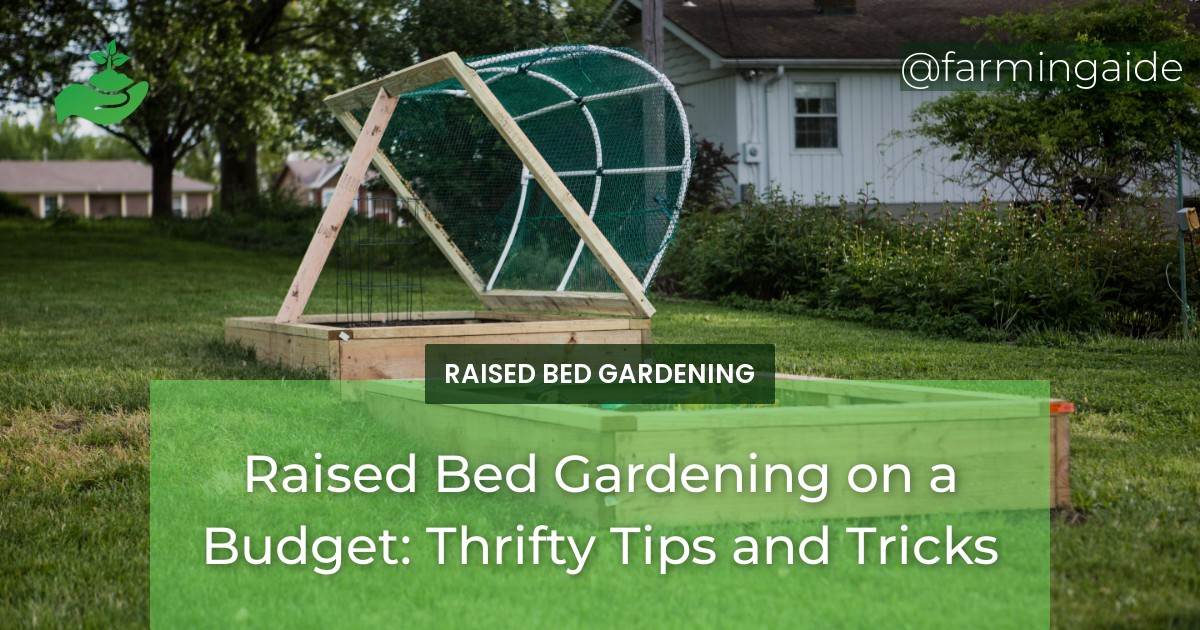Raised bed gardening is a method of gardening that involves growing plants in soil that is raised above ground level. This type of gardening has become increasingly popular in recent years, due to its many benefits. Raised bed gardening is ideal for those who have limited space, poor soil quality, or physical limitations that make traditional gardening difficult.
In this article, we will provide you with some thrifty tips and tricks for raised bed gardening budget.
Table of Contents
Benefits of Raised Bed Gardening
Before we dive into the tips and tricks, let’s take a quick look at the benefits of raised bed gardening:
- Improved soil quality
- Better drainage
- More efficient use of space
- Less strain on your back and knees
- Less weeding needed
- Longer growing season
Advantages of Raised Bed Gardening on a Budget
Raised bed gardening can be expensive, but with the right knowledge, it can also be very cost-effective. Growing your own food can save you money in the long run, and with these thrifty tips and tricks, you can set up a raised bed garden without breaking the bank.
Cost-Effective Raised Bed Construction Ideas
Materials
There are many different materials you can use to construct a raised bed. Here are some ideas for cost-effective raised bed construction:
- Using recycled materials such as old pallets or cinder blocks
- Using cheap but durable materials such as untreated lumber or galvanized steel roofing panels
Designs
When it comes to raised bed designs, simplicity is key. Here are some simple and practical designs:
- A basic rectangle or square design
- A U-shaped design for easy access
If you’re feeling handy, you can also try building your own raised bed using these DIY designs:
- A raised bed made from reclaimed wood
- A raised bed made from concrete blocks
Size and Location
The size and location of your raised bed can also affect the cost. Here are some tips:
- Choose an optimal size for cost-effectiveness, such as 4×4 or 4×8 feet
- Choose a location that gets plenty of sunlight and is close to a water source to save money on irrigation
ALSO READ
Affordable Soil and Plant Choices
Soil
Soil is a crucial component of any garden, but it can also be expensive. Here are some tips for affordable soil:
- Make your own soil mix using compost, peat moss, and vermiculite or perlite
- Use cheap alternatives to store-bought soil, such as topsoil or garden soil
Plants
Choosing the right plants for your raised bed can also help you save money. Here are some tips:
- Choose cost-effective plants such as tomatoes, peppers, and herbs
- Choose plants that grow well in raised beds, such as strawberries, lettuce, and radishes
DIY Projects
Building Your Own Raised Bed
If you’re feeling handy, building your own raised bed can be a cost-effective option. Here are some tips:
- Follow a step-by-step guide to building a raised bed
- Use cost-effective materials such as untreated lumber or galvanized steel roofing panels
Creating Your Own Compost
Making your own compost is not only cost-effective, but it’s also great for your garden. Here are some benefits and DIY compost bin ideas:
- Benefits of making your own compost include reducing waste and improving soil quality
- DIY compost bin ideas include using a trash can or building a bin out of pallets
Planting Accessories
Adding accessories to your raised bed can also be cost-effective. Here are some ideas:
- Build a DIY trellis or support system using bamboo or rebar
- Use a cost-effective watering system such as a soaker hose or drip irrigation
ALSO READ
Maintenance Tips for a Thrifty Garden
Pest Control
Dealing with pests can be expensive, but there are cost-effective and natural methods you can use to control them. Here are some tips:
- Use companion planting to naturally repel pests
- Use natural pest control methods such as neem oil or diatomaceous earth
Maintenance Schedule
Preventative maintenance and a budget-friendly schedule can help you save money in the long run. Here are some tips:
- Take preventative measures such as crop rotation and proper watering to avoid problems later on
- Create a budget-friendly maintenance schedule that includes tasks such as weeding and pruning
How Can I Create an Aesthetically Pleasing Raised Bed Garden on a Budget?
Creating an aesthetically pleasing raised bed garden on a budget is achievable with the right raised bed garden designs. Utilize inexpensive materials like recycled wood or cinder blocks for the beds. Incorporate vertical gardening to maximize space and add visual interest. Select colorful plants for a vibrant, budget-friendly garden.
Conclusion
With these thrifty tips and tricks, you can set up a cost-effective raised bed garden that will provide you with fresh produce for years to come. Remember to choose cost-effective materials, make your own soil, choose the right plants, and use natural pest control methods to keep your garden thriving. Happy gardening!
RELATED ARTICLES:


